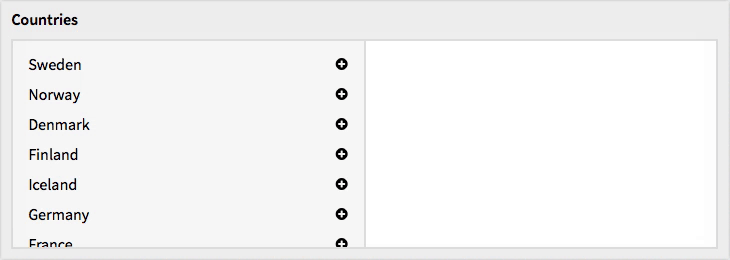Kirby Relationship field
The Relationship field allows you to select and sort multiple items from a list. Think of it as a sortable multiselect field or a sortable checkboxes field.

This plugin is free to use. But if you find it helpful, feel free to buy me a coffee ☕️.
Requirements
This field has been tested with Kirby 2.5+, but it should probably work with earlier versions too.
Looking for a version compatible with Kirby 3? A new version is currently in development.
Installation
Manually
Download the files and place them inside site/fields/relationship/.
With Kirby CLI
Kirby's command line interface makes the installation really simple:
$ kirby plugin:install olach/kirby-relationshipUpdating is also easy:
$ kirby plugin:update olach/kirby-relationshipUsage
The field is an extension of the Checkboxes field. All options of that field apply to this field too. The data is saved as a comma separated string, which means that this field is interchangeable with the Checkboxes field.
Example with predefined options
Blueprint
countries:
label: Countries
type: relationship
options:
sweden: Sweden
norway: Norway
denmark: Denmark
finland: Finland
iceland: Iceland
germany: Germany
france: France
spain: Spain
portugal: PortugalTemplate
<ul>
<?php foreach ($page->countries()->split() as $country): ?>
<li><?= $country ?></li>
<?php endforeach ?>
</ul>Example with related pages
Blueprint
related:
label: Related articles
type: relationship
options: query
query:
fetch: siblingsTemplate
<h2>Related articles</h2>
<ul>
<?php foreach ($page->related()->pages(',') as $related): ?>
<li>
<a href="https://github.com/olach/kirby-relationship/blob/master/<?php echo $related->url() ?>">
<?= $related->title() ?>
</a>
</li>
<?php endforeach ?>
</ul>Features
Search:
To enable search, add search: true to the field settings in your blueprint.
related:
label: Related articles
type: relationship
options: query
query:
fetch: siblings
search: trueMin and max items:
You can control the minimum number of required items and the maximum number of allowed items. Don't forget to add a help text to inform the editor about the requirements.
related:
label: Related articles
type: relationship
options: query
query:
fetch: siblings
search: true
min: 3
max: 6
help: Select from 3 up to 6 articles.Counter indicator
A handy indicator of the current amount of selected items can be displayed in the upper right corner with the option counter. This indicator is always shown when the min/max option is active, but can be disabled by setting its value to false.
related:
label: Related articles
type: relationship
options: query
query:
fetch: siblings
search: true
counter: trueController:
This field is extended with an option to use a user specified function to have even more control of the options that will be loaded. The idea is taken from the Controlled List plugin.
Example
Create a simple plugin that lets you choose from the panel users.
site/plugins/myplugin/myplugin.php:
class MyPlugin {
static function userlist($field) {
$kirby = kirby();
$site = $kirby->site();
$users = $site->users();
$result = array();
foreach ($users as $user) {
if (!empty($user->firstName()) && !empty($user->lastName())) {
$result[$user->username()] = $user->firstName() . ' ' . $user->lastName();
} else {
$result[$user->username()] = $user->username();
}
}
return $result;
}
}In your blueprint:
users:
label: Users
type: relationship
controller: MyPlugin::userlistThumbnails:
It's possible to show a small thumbnail for each list item. There are three different ways to do this:
Options list
Manually specify a set of URLs pointing to images to be used as thumbnails.
No downscaling is performed here, the images are used as is. So be kind to your users and don't link to high resolution images.
countries:
label: Countries
type: relationship
options:
sweden: Sweden
norway: Norway
denmark: Denmark
finland: Finland
iceland: Iceland
germany: Germany
france: France
spain: Spain
portugal: Portugal
thumbs:
options:
sweden: /assets/images/flag-sweden.png
norway: /assets/images/flag-norway.png
denmark: /assets/images/flag-denmark.png
finland: /assets/images/flag-finland.png
iceland: /assets/images/flag-iceland.png
germany: /assets/images/flag-germany.png
france: /assets/images/flag-france.png
spain: /assets/images/flag-spain.png
portugal: /assets/images/flag-portugal.pngImage field
By specifying the field name of an image field, the thumbnails can be fetched automatically. This requires that the list items are regular pages with an image field specified. Also, make sure that the value attribute used are page URIs.
The images are shown downscaled. The default thumbnail size of the panel is used, so no additional thumbnail generation is being done.
related:
label: Related articles
type: relationship
options: query
query:
fetch: siblings
value: '{{uri}}'
thumbs:
field: featured_imageThumbnails controller
For full control, you can specify a user specified function to be used for the thumbnails. The function needs to return a URL to an image.
The following example extends the previous panel users example by showing their avatars as thumbnails.
site/plugins/myplugin/myplugin.php:
class MyPlugin {
static function userlist($field) {
$kirby = kirby();
$site = $kirby->site();
$users = $site->users();
$result = array();
foreach ($users as $user) {
if (!empty($user->firstName()) && !empty($user->lastName())) {
$result[$user->username()] = $user->firstName() . ' ' . $user->lastName();
} else {
$result[$user->username()] = $user->username();
}
}
return $result;
}
static function useravatar($key, $field) {
$kirby = kirby();
$site = $kirby->site();
$url = '';
if ($avatar = $site->user($key)->avatar()):
$url = $avatar->crop(75)->url();
endif;
return $url;
}
}In your blueprint:
users:
label: Users
type: relationship
controller: MyPlugin::userlist
thumbs:
controller: MyPlugin::useravatarKeyboard navigation:
The field is keyboard accessible. Press tab and shift + tab to give focus to the lists. Within a list, use the arrow keys to navigate and press space to select/deselect an item. In the sortable list, you can sort the items by selecting an item with space and then move the item using the arrow keys.
Version history
You can find the version history in the changelog.


